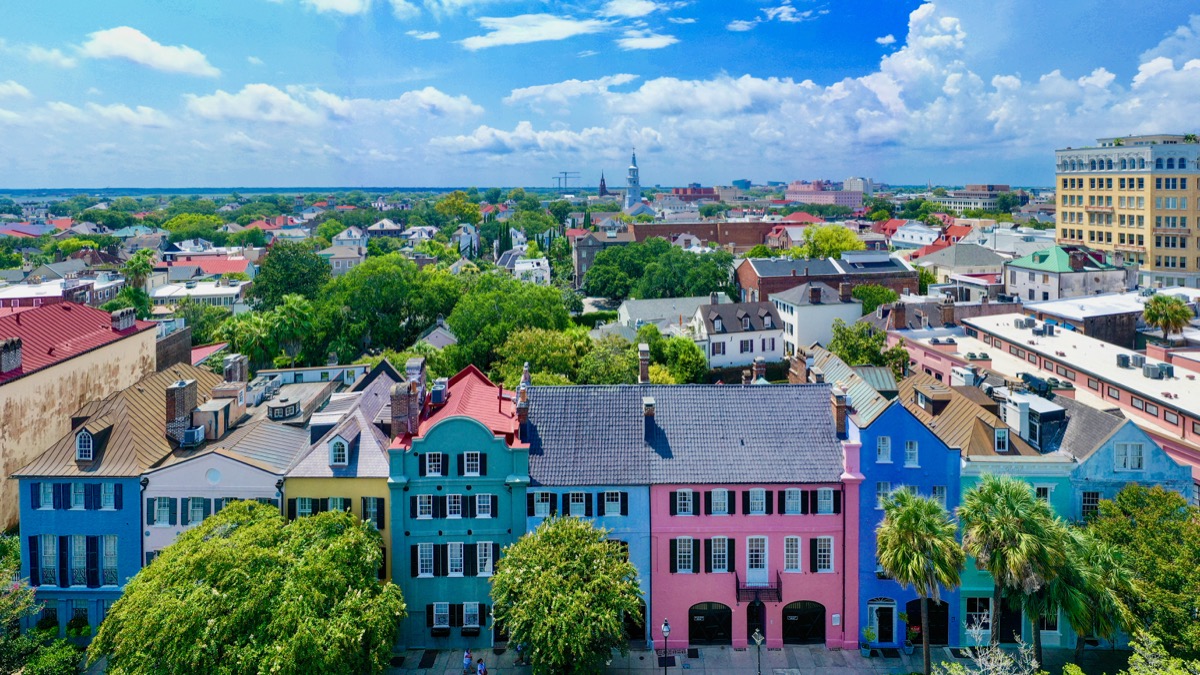According to the CDC, the average life expectancy of a person born in the United States is currently 78.7 years, with women averaging 81.2 years and men about 76.2. The data also looks at the average life expectancy* at birth in each of the 50 states—presented here from longest to shortest. Read on to discover how long you are expected to live in your state. *For reference, the number of years included for each state are rounded, but ranking order is based on the unrounded life expectancies. RELATED: This Is the Most Overpriced College in Your State, According to Data. Life expectancy: 81.0 years Hawaii’s abundance of natural beauty and outdoor activities may be key elements in its population’s relatively long lifespan. In addition to having the second lowest per capita COVID death rate in the nation during the 12-month period ending in Dec. 2020, it also has the second lowest rate of heart disease in the nation, according to the CDC. Life expectancy: 80.8 years While California was hit particularly hard by the COVID-19 pandemic, the CDC reports that the state ranks 42nd in terms of heart disease-related deaths and manages to have one of the highest life expectancies in the nation at nearly 81 years. RELATED: This Is the Most Dangerous State in America. Life expectancy: 80.5 years Though New York had the second highest rate of COVID-related death during the 12-month period ending in Dec. 2020, its overall life expectancy is high nonetheless at 80.5 years. Life expectancy: 80.5 years One possible reason for Minnesotans’ high life expectancy? The state has the lowest rates of heart disease-related death in the nation, at 116.7 deaths per 100,000 residents. Life expectancy: 80.4 years Not only do Nutmeggers have relatively low rates of heart disease-related death (ranking 39th out of 50 states), but they also have among the highest life expectancies in the nation. However, the pandemic hit the state hard, resulting in approximately 112.9 deaths per 100,000 residents at the end of 2020. Life expectancy: 80.1 years As of 2019, the Bay State ranked 48th in the nation for heart disease-related deaths, which may account for Massachusetts residents’ relatively long life expectancy. Life expectancy: 80.0 years Washington state had one of the lowest death rates from COVID at the end of 2020, with approximately 36.9 residents per 100,000 dying of the ailment that year. Washington also manages to rank low for heart disease-related deaths, with 134.8 heart disease-related deaths per 100,000 residents. Life expectancy: 80.0 years While Colorado residents may have a relatively high life expectancy at 80 years, the state’s number of overdose-related deaths have been on the rise. According to the CDC, the state saw a 39 percent jump in overdose-related deaths between Jan. 2020 and Jan. 2021. Life expectancy: 79.8 yearsae0fcc31ae342fd3a1346ebb1f342fcb New Jersey residents have an average life expectancy of 79.8 years, and things are only looking up for the Garden State. The CDC reports that, between 2020 and 2021, the state was one of only three in the nation to see its number of overdose-related deaths decline. Life expectancy: 79.8 years Rhode Island was hit hard by the pandemic, with approximately 105.2 residents per 100,000 dying from COVID in the 12-month period ending in Dec. 2020. However, the state ranks among the lowest in terms of homicide rates, with 23 homicide deaths per 100,000 residents in 2019. Life expectancy: 79.7 years Could Oregonians’ heart health be the key to their longevity? According to the CDC, the state had 131 heart disease-related deaths per 100,000 residents as of 2019, with cancer outpacing heart disease as the leading cause of death in the state. Life expectancy: 79.6 years While Utahns don’t have the highest life expectancy in the U.S., the state has the lowest rate of cancer-related mortality in the nation. As of 2019, 117.2 Utah residents per 100,000 died of cancer. Life expectancy: 79.3 years Vermont had the lowest rate of COVID-related deaths during the 12-month period ending in Dec. 2020, but that’s not the only factor contributing to residents’ longevity. The state also ranks 31st for heart disease-related deaths and had the lowest homicide rate in the nation as of 2019. Life expectancy: 79.3 years What’s behind North Dakota residents’ relatively long lifespan? According to a 2020 survey conducted by Wallethub, the state’s residents rank seventh in terms of overall happiness. Life expectancy: 79.3 years While Wisconsin ranked 24th in terms of heart disease-related mortality, the state’s residents fared well in terms of longevity-promoting life satisfaction, ranking 18th in terms of happiness, according to Wallethub. Life expectancy: 79.2 years Though Iowa ranks 16th out of the 50 states in terms of per capita heart disease-related deaths, state residents can enjoy an average lifespan of over 79 years. Life expectancy: 79.1 years Ranking 38th for heart disease-related deaths and 37th for firearm-related mortality, New Hampshire residents are tied with Nebraskans when it comes to longevity. Life expectancy: 79.1 years Coming in 37th in terms of heart disease-related mortality and 11th in terms of happiness, Nebraska residents live for just over 79 years, on average. Life expectancy: 79.0 years Ranking 32nd for heart disease-related deaths and ninth in terms of happiness, Idaho residents are tied with Virginians, with an average life expectancy of 79 years. Life expectancy: 79.0 years Coming in at 14 on Wallethub’s happiest states survey and 34th in terms of heart disease-related mortality, Virginians can expect to live for an average of 79 years. Life expectancy: 78.9 years South Dakota landed the number 12 spot in terms of happiest states in Wallethub’s survey and ranks 26th when it comes to heart disease-related mortality. Life expectancy: 78.9 years The Sunshine State ranks 41st in the nation for heart disease-related deaths and 39th in terms of cancer-related mortality, which may factor into Floridians’ relatively long lifespans. RELATED: This Is the Most Unhealthy State in America. Life expectancy: 78.8 years Illinois saw a 24.3 percent surge in overdose-related deaths between Jan. 2020 and Jan. 2021. However, the state’s overall life expectancy remains high at close to 79 years. Life expectancy: 78.7 years Though Montana ranks 10th for firearm-related mortality in the U.S., the state snags the 27th spot in terms of overall longevity. Life expectancy: 78.7 years Arizona residents have an average lifespan of nearly 79 years—and the coming in 40th out of 50 states in terms of heart disease-related mortality might just have something to do with it. Life expectancy: 78.6 years Coming it at 34th for firearm-related deaths and 40th for heart disease-related mortality, Mainers live for between 78 and 79 years, on average. Life expectancy: 78.5 years Ranking fifth for happiness and 23rd for heart disease-related mortality, Maryland residents live for more than 78 years, on average. Life expectancy: 78.4 years Texas ranks 20th for heart disease-related mortality and 48th for overdose-related mortality, with residents living just shy of 78-and-a-half years. Life expectancy: 78.1 years Wallethub clocked Pennsylvania as the 28th happiest state in the nation, and with an average lifespan of over 78 years and the 33rd rank for firearm mortality out of the 50 states, who can blame them? Life expectancy: 78.1 years Wyoming residents can expect to live just north of 78 years, on average, with the state ranking 33rd for heart disease-related deaths. Life expectancy: 78.0 years While Kansas ranks 18th in the nation for heart disease-related mortality, the state saw a 21.4 percent uptick in overdose-related deaths between Jan. 2020 and Jan. 2021. Life expectancy: 78.0 years Alaska residents may have their relatively low rates of heart disease to thank for their healthy lifespan. Out of the 50 states, Alaska ranks 46th for heart disease-related deaths. Life expectancy: 77.9 years There’s a lot of fun to be had in Nevada—but that doesn’t mean residents are here for a good time, not for a long time. While the state ranks seventh for heart disease-related deaths, residents still live to nearly 78, on average. Life expectancy: 77.8 years While Delaware residents rank 30th in terms of heart disease-related mortality, the state fares better in terms of firearm deaths, ranking 40th out of 50 states. Life expectancy: 77.7 years Ranking 10th for heart disease-related mortality, Michigan residents can expect to live for just shy of 78 years, on average. For more state facts and rankings delivered straight to your inbox, sign up for our daily newsletter. Life expectancy: 77.6 years North Carolina ranks 12th for infant mortality and 29th for heart disease-related deaths out of the 50 states. However, the state doesn’t fare quite so well in terms of overall wellbeing, ranking 32nd for happiness according to Wallethub. Life expectancy: 77.2 years Georgia ranks 14th in the nation for heart disease-related mortality and comes in 14th in terms of firearm-related mortality, with 15.8 firearm-related deaths per 100,000 residents. Life expectancy: 77.2 years New Mexico ranks 25th in terms of heart disease-related deaths in the U.S., but lands the number four spot for firearm-related mortality. Life expectancy: 76.8 years Indiana residents have the 13th highest rates of heart disease-related mortality in the nation, which may contribute to their comparatively short lifespan. The state doesn’t fare much better when it comes to overall wellbeing, ranking 36th out of 50 states for happiness. Life expectancy: 76.8 years Ohio ranks 11th when it comes to heart disease-related deaths in the nation. The state also saw the third highest rates of overdose-related deaths in the country as of 2019. Life expectancy: 76.6 years Ranking 12th in terms of heart disease-related deaths and seventh for firearm-related deaths, Missouri residents take the number 10 spot in terms of U.S. life expectancy. Life expectancy: 76.5 years South Carolina ranked 19th out of 50 states in terms of heart disease-related death as of 2019, and the state’s overdose-related death rate has seen a steep increase in recent years. Between Jan. 2020 and Jan 2021 alone, the CDC reports a spike of 50.8 percent in overdose-related deaths. Life expectancy: 75.6 years Like many other U.S. states, the leading cause of death in Arkansas is heart disease, with 8,669 residents of the state losing their lives to the condition in 2019. With a heart disease death rate of 226.5 per 100,000 residents, the state ranks third in the nation for heart disease-related deaths. Life expectancy: 75.6 years Not only does Oklahoma’s life expectancy look low compared to the states around it, but it also ranks highest for heart disease deaths in the nation. In 2019, Oklahoma had 231.4 heart disease-related deaths per 100,000 residents. Life expectancy: 75.6 years Louisiana’s heart disease death rate may account for its residents’ relatively low life expectancies. According to CDC data, the state saw 207.8 heart disease-related deaths per 100,000 residents in 2019. Life expectancy: 75.5 years Tennessee’s high rates of heart disease may factor into its residents’ abbreviated lifespans. In 2019 alone, 16,814 Tennesseans fell victim to heart disease-related deaths. Life expectancy: 75.3 years In addition to having the nation’s ninth highest rates of heart disease-related deaths, Kentucky had approximately 32.5 overdose-related deaths per 100,000 residents and 14.9 firearm-related deaths per 100,000 residents as of 2019. Life expectancy: 75.1 years In addition to having a relatively short life expectancy, Alabama has the nation’s highest infant mortality rate, with approximately 7.9 infant deaths per 1,000 live births. Life expectancy: 74.6 Not only does Mississippi rank second for heart disease-related deaths in the U.S., but the state also saw a staggering number of COVID deaths. In the 12-month period ending in Dec. 2020, the state saw 124.6 COVID deaths per 100,000 residents. Life expectancy: 74.4 years Heart disease is the leading cause of death in West Virginia, with 5,087 West Virginians succumbing to the condition in 2019. The state also has the nation’s highest rate of deaths from drug overdoses, at 52.8 per 100,000 residents. RELATED: This Is the Most Expensive State in America.
















































